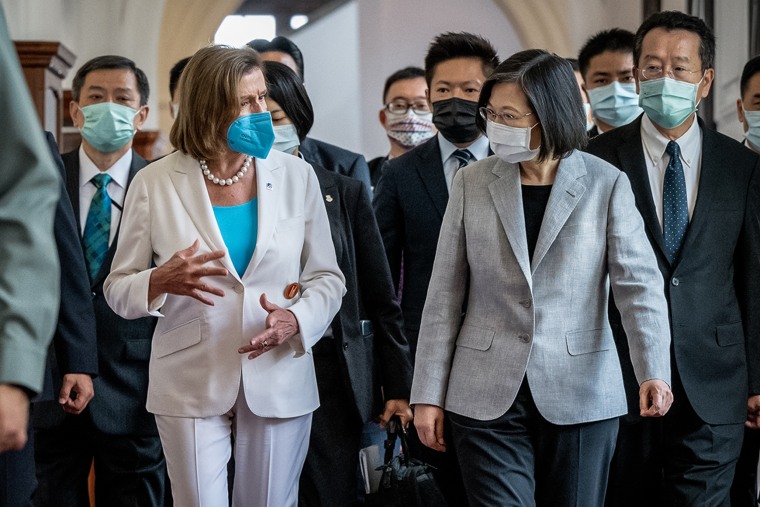TAIPEI, Taiwan — The Biden administration will send an unofficial delegation to Taiwan after the island’s presidential and legislative elections this Saturday, in a move that is likely to irritate Beijing.
The results could drive the self-ruling democracy further toward or away from Beijing, which claims Taiwan as its territory. China, which has not ruled out the use of force in its effort to unify with the island, has framed the election as “a choice between war and peace.”
The status of Taiwan is among the most sensitive issues between China and the United States, the island’s most important international backer.
A senior Biden administration official confirmed the planned delegation Wednesday but did not provide details, saying its exact timing and makeup were still being decided.
The official, briefing reporters on the condition of anonymity, said such delegations were “the most effective way” for the U.S. to engage with Taiwan, with which it has unofficial relations, and that they contribute to peace and stability.
The Chinese Foreign Ministry said Thursday that China opposes “any form of official exchange” between the U.S. and Taiwan, calling Taiwan’s election an “internal affair.”
The U.S. should “cease official interactions with Taiwan, refrain from sending any mistaken signals to separatist forces, and avoid any form of interference in Taiwan’s regional elections,” spokesperson Mao Ning said at a regular news briefing in Beijing.
Earlier Thursday, China’s Taiwan Affairs Office warned against voting for Lai Ching-te, the governing Democratic Progressive Party’s presidential candidate and the front-runner in the race. In a statement, it said Lai was a “stubborn Taiwan independence worker” who if elected would promote separatist activities and “create a dangerous situation” in the Taiwan Strait.
Taiwan’s Foreign Ministry criticized the remarks as an attempt to intimidate Taiwanese voters and influence the election.
Lai, who is the current vice president, said at a news conference Tuesday that he would “maintain the status quo” consistent with the policies of President Tsai Ing-wen and that under his administration Taiwan’s door would “always be open to engagement with Beijing under the principles of equality and dignity.”
His closest challenger, polls show, is Hou Yu-ih from the main opposition party, the Kuomintang (KMT), which favors closer ties with Beijing. At a news conference on Thursday, his running mate, Jaw Shaw-kong, welcomed the delegation, saying it “shows the election is of great importance” to the U.S.
The third presidential candidate is Ko Wen-je, founder of the populist Taiwan People’s Party (TPP), which also favors closer ties. Both parties have criticized the DPP’s policies toward China as too confrontational.
The Biden administration official said the U.S. had been in “regular touch” with all three men but had no preferred candidate.
“Regardless of whom is elected, our policy toward Taiwan will remain the same and our strong, unofficial relationship will also continue,” the official said.
The official said the U.S. has “full confidence” in the electoral process in Taiwan, one of the strongest democracies in Asia, and that it opposed any external interference. Any disruption to peace and stability across the Taiwan Strait, a key shipping route, “would seriously damage the global economy,” the official said.
The official said the U.S. has a long history of sending unofficial delegations of former officials to Taiwan, including two since President Joe Biden took office, and that they were not viewed as “escalatory” by Beijing.
“The timing will be seen as provocative because it’s right after the election, but it still is a matter of the United States endorsing a free and fair democracy, regardless of who wins,” said Lev Nachman, a political scientist and assistant professor at National Chengchi University in Taipei.
The Biden administration official also said the U.S. and China would maintain recently reopened military channels of communication throughout the election and transition period. Military representatives from both sides held two days of talks in Washington this week as the two countries try to restore military ties that Beijing cut off in 2022 in protest over then-House Speaker Nancy Pelosi’s visit to Taiwan.
China also responded to Pelosi’s visit with its biggest-ever military drills around Taiwan, and it has stepped up military pressure ever since.
Biden and Chinese Xi Jinping agreed to resume military ties at a meeting in San Francisco in November, their first meeting in a year. At the same meeting, Biden reiterated that U.S. policy on Taiwan has not changed and the U.S. does not support Taiwan independence.

No matter the electoral outcome in Taiwan, relations between Taipei and Beijing are unlikely to change “on a big scale,” said Shelley Rigger, a professor of East Asian politics at Davidson College in North Carolina.
“I don’t think either party is really pro-China or pro-independence in the way that the other party’s supporters believe,” Rigger said, adding that while the KMT might get along better with Beijing, that doesn’t mean it “supports Taiwan being absorbed into China.”
Though Beijing prefers to deal with the KMT, Rigger said, “they can co-exist with DPP” and would rather avoid conflict with Taiwan.
“When the KMT was in power in Taiwan, back between 2008 and 2016, the PRC wasn’t particularly happy with what was happening at that time, either,” she said, using the initials for China’s formal name, the People’s Republic of China. “So the pattern of frustrated relations is that the two sides try to manage their relationship as best as they can.”
Janis Mackey Frayer reported from Taipei, Taiwan, and Larissa Gao reported from Hong Kong.


